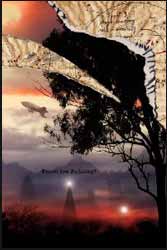|
Click here to return to the main site. Book Review
Anthologies are always a good way of catching up with some of your favourite authors, as well as an opportunity to encounter some new. With the publication of Where are We Going, an anthology edited by Allen Ashley, a well-respected writer in his own right, based, loosely, around the concept of ‘The Journey’ in all its aspects another splendid opportunity exists to delve into the world of the independent press. Journeys can involve many aspects and idea and in truth there are few stories here which restrict themselves to physical description of characters going from A to B. Xana-La, by Stephen Palmer, is one of the exception to the rule. But even here, although the story is written like an nineteenth century adventure, it is clearly set in a world which is only similar to our own. Most of the stories take great delight in exploring the often darker substrata of the human psyche and experience. The opening steampunk story displays many of the elements of the anthologies stories. Dead Countries by Gary Budgen takes a cavalier attitude towards genre restriction; in fact nearly all of the stories exist to tell a good tale without feeling the need to fulfil the expectations of any particular niche market. This can only be looked on as a good thing and something which has been finding its way into mainstream entertainment for some time. Consider Alien, which is as much a haunted house fantasy as it is a science fiction film. Even as far back as the writings of H. P. Lovecraft there have been writers who were more interested in the art of the written word than they were in fulfilling the expectations of a limited market. In Dead Countries we are introduced to two friends. The first has a life which slowly slides into drug abuse, whilst his friend spends his time collecting stamps and stories from a supposedly no longer existent country. Gary Budgen twists our expectation and understanding of Quassia, at times the reactions of other, especially a stamp dealer would imply that the place exists, at other times the implication is that it is all in Eric’s mind, a delusion. But, in the end, the quest for happiness is always part self-delusion. Francis finally ends up in part of his life where even the hoped for delusion of happiness is better than the existence of a drug addict. Many, if not most of the short stories have a similar multi layered structure. Here it can either be read at its surface level as simply a well-constructed piece of prose and there is nothing wrong with this. In fact it is a prerequisite to making the stories enjoyable to read. But dig a little deeper and all human life can be found within these pages. The book covers many genres, sometimes within the same story. A Faraway City by Joel Lane tells the unsettling story of a woman who can experience, in her dreams, the real experiences of abused women. The Way the World Works by Ian Sales, appear to be a claustrophobic journey to the depths of the ocean only to turn into a journey to cosmic understanding. A Guide to Surviving Malabar by Ian Shoebridge tell the tale of a man who goes on holiday to an Island which appears not only to be alive but also appears to want to attack and kill the inhabitants. A horrific idea, but our protagonist discovers that in a world of conveniences, that sometimes the greatest challenge also gives you the greatest feeling of being alive. In total, there are seventeen tales here for your delectation. Again, another delightful reading experience which challenges and entertains in equal amounts. 10 Charles Packer |
|---|


